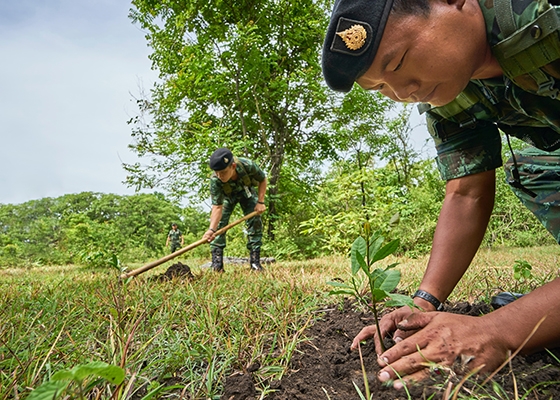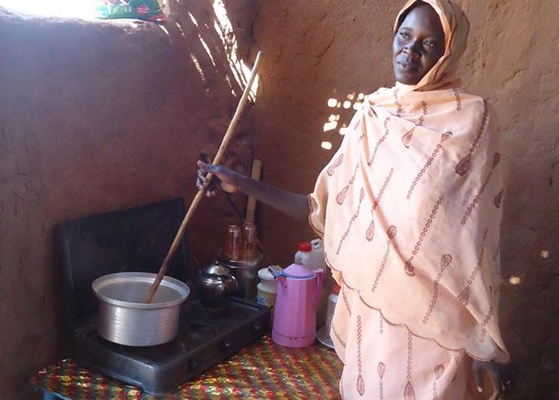Misconceptions About Carbon Offsetting
What is carbon offsetting and is it just another greenwashing tactic? We investigate how offsetting works and why it’s so much more than just planting a tree.
Carbon Offsetting, Carbon Neutral, Carbon Positive… we hear these phrases thrown around a lot these days. Many companies now claim to be Carbon Neutral or even Carbon Positive in their operations, but what does this mean and is it true? Does the responsibility lie solely on companies and industry, or is there something that we as consumers can do to help? We spoke to Co Founder of Terra Neutra, Charlotte Bullock to find out more about offsetting, why tree planting isn’t the only way to do it and why it’s far more accessible than you might think.
What Is Carbon Offsetting
Carbon is a big issue. The world is warming up, and carbon, as well as methane, nitrogen and other greenhouse gas emissions are to blame. Trapped inside our atmosphere, they are causing the temperature of our planet to warm up. What’s wrong with a little warm weather we hear you say? Melting ice caps, rising sea levels, extreme weather events and the decimation of entire eco systems are the result of our planet warming by just a few degrees. However the good news is, our planet, the clever ball of rock it is, has a nifty way to get rid of carbon for us. Trees and peatlands are just a few naturally occurring systems that actually take carbon from our atmosphere and trap it.
“An offset is defined as being a net reduction in carbon that would not have otherwise happened without the carbon financing from the sale of the offsets,” Charlotte Bullock, Co Founder of Terra Neutra told us. It has become more and more popular for companies to offset their carbon emissions, or encourage their customers to do so by planting trees. Although we have around 3 trillion trees on our planet, trees are being cut down at a rate of around 15 billion per year. There is no argument that trees aren’t greatly needed for the survival of Earth, but is tree planting as an offsetting method being used in the wrong way? Can we simply plant a few trees and enjoy a guilt free trip to Mexico?

Misconceptions Around Carbon Offsetting
“The biggest misconception around carbon offsetting is that it’s an unregulated world,” Charlotte explained. “We only work with projects that are Verra or Gold Standard certified.” A report by Ecosystems Marketplace found that 88% of voluntary carbon offset buyers have adopted formal emissions reduction targets. This means that when a company is offsetting, it is likely to be one part of a larger goal to reduce emissions throughout their practises. As well as providing offsetting options, Terra Neutra see’s part of it’s role as educational. Charlotte tells us that, “We always encourage people to start by reducing their carbon footprint as much as possible and then offsetting the rest.”
Planting trees may be the most well known method of carbon offsetting, however it’s by no means the only legitimate one. As well Rainforest Conservation in Cambodia, they offer access to Peatland Conservation as well as funding low smoke cookstoves in Sudan. Like trees, peatland in Indonesian Borneo is a valuable carbon sink. “The clearing, draining and burning of peatland is estimated to contribute 18-20% of Indonesian’s greenhouse gas emissions by 2020,” Charlotte told us. “By investing in the protection of the Katingan Peatland, we are ensuring the 561m tonnes of carbon stored in the peatland is not released into the atmosphere.” These conservation efforts are helping to preserve the land that would otherwise be lost to the expansion of industrial plantations.
Enjoying this article?
Then you'll love our Newsletters. At the beginning of each month, we send you the low down for the month ahead, featuring news and our favourite responsible products and brands you need to know about. And whats more, you receive all of this direct to your inbox before anyone else.
The Right to Access Clean Energy
In Darfur, Sudan, the women who traditionally cook for their families in their homes suffer from ill health due to cooking indoors using wood for cooking fuel. The fuel releases particulates into the air causing wide scale health problems. Around 26.1 million people in Sudan lack access to clean cooking in their homes. Deaths attributed to indoor air pollution kills more people than HIV, Malaria and TB combined!
Gold Standards Low Smoke Cookstove initiative is the first registered carbon credit project in Sudan and the first to be developed in a conflict zone. 100% of families who received cookstoves through the scheme say that indoor air quality has greatly improved. The new stoves also free up women’s time to go out to work or spend more time with their family. Each stove saves 4.5tCO2e, the equivalent of one passenger flying 3 times between London and New York. Not only do projects such as this have environmental impacts, they also have positive social impact too.

What Can You Do?
As a consumer, we believe you have more power than you know. At Terra Neutra, they offer simple subscriptions to help you offset particular area of your life, such as your cat. Or you can choose to offset your families annual footprint. “We live in a mechanized society so there is always a carbon footprint whatever we do,” says Charlotte. “That said if you manage to reduce your carbon footprint and offset too then you are contributing to a carbon positive society.” Download Terra Neutra’s free Slow Living Notebook today to start reducing your footprint.
The company are also making strides in the B2B world. Their new app ClearSky allows retailers to help customers calculate the ‘Carbon Cost’ of the product they are purchasing. It calculates the carbon footprint of the item, then tells the customer and retailer what the cost to offset it will be. The cost can then be covered by either the seller or the customer. “In both cases, the carbon cost is presented at the point of sale, thereby raising consumer awareness of the carbon cost of their purchases.”
BEEN London has already trailed the service and discovered that their Columbia Crossbody Bag has the carbon footprint of a Margherita Pizza! We spoke to BEEN London Founder Genia Mineeva about the process and she told us that, “we looked at everything from the footprint of our co working space to the finished product.” Genia wanted to be able to answer questions like – does shipping by sea make us better, was recycled nylon better than recycled cotton? She is now using this information to make her business carbon neutral and eventually carbon positive. Awareness seems to be the most important first step towards a carbon positive future for our planet. And there are so many ways to reduce your footprint as well as offset it.
Did This Put A Smile On Your Face? Why Not Subscribe?
If you enjoyed this then theres plenty more on our email newsletters that you'll love. Whether you're a sustainable newbie or an eco conscious pro, our bi monthly emails will inspire you to live sustainably and ethically.









Trackbacks/Pingbacks